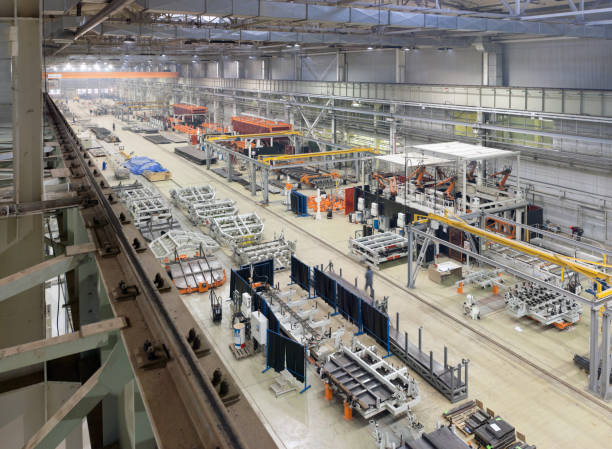
The UAE is a hub for construction, industrial development, and infrastructure projects. Heavy machinery companies in the UAE play a crucial role in supporting these sectors by providing advanced equipment, machinery rentals, and maintenance services. From large-scale construction sites to mining and transportation industries, these companies supply a wide range of machinery, including excavators, bulldozers, cranes, and forklifts. The demand for heavy equipment continues to grow as the UAE invests in new developments, road networks, and industrial zones.
Heavy machinery manufacturers and suppliers in the UAE cater to industries such as oil and gas, real estate, and logistics. These companies offer machinery sales, leasing options, and after-sales support, ensuring smooth project execution. Additionally, advancements in technology have led to the introduction of eco-friendly and fuel-efficient equipment, meeting modern construction and environmental standards.
This guide provides a complete industry overview, covering the types of heavy machinery available, major sectors utilizing them, key considerations when choosing machinery, and future trends shaping the industry.
Key Sectors Utilizing Heavy Machinery in the UAE
The UAE’s rapid development has increased the demand for heavy machinery across various sectors. Below are the key industries relying on heavy equipment:
1. Construction and Real Estate
The UAE is known for its iconic skyscrapers, residential complexes, and commercial projects. Heavy machinery such as cranes, bulldozers, and concrete mixers are essential for large-scale construction projects. The real estate sector relies on excavators for land preparation and tower cranes for high-rise building development.
2. Oil and Gas Industry
With vast oil and gas reserves, the UAE’s petroleum sector heavily depends on heavy machinery. Equipment such as drilling rigs, pipeline layers, and offshore cranes are used in exploration, drilling, and refining operations. The industry also requires specialized machinery for safety and maintenance procedures.
3. Mining and Quarrying
The UAE has an active mining sector, with limestone, gypsum, and aggregates being extracted for construction. Heavy machinery like crushers, loaders, and dump trucks are used to process and transport raw materials from quarries to industrial sites.
4. Transportation and Logistics
Ports, airports, and logistics hubs in the UAE utilize heavy equipment such as container handlers, forklifts, and reach stackers. These machines facilitate cargo movement, loading, and unloading at major transport terminals.
5. Infrastructure Development
From roads and bridges to metro lines and tunnels, infrastructure projects in the UAE rely on advanced heavy machinery. Asphalt pavers, compactors, and tunnel boring machines are widely used for public infrastructure construction.
Types of Heavy Machinery Used in the UAE
Heavy machinery companies in the UAE provide a variety of equipment for different industries. Below are the primary types of machinery used:
1. Earthmoving Equipment
-
Excavators
-
Bulldozers
-
Loaders
-
Motor Graders
-
Backhoe Loaders
2. Material Handling Equipment
-
Forklifts
-
Cranes (Tower, Mobile, Crawler)
-
Conveyors
-
Telehandlers
3. Road Construction Machinery
-
Asphalt Pavers
-
Rollers and Compactors
-
Concrete Mixers
-
Road Milling Machines
4. Lifting and Hoisting Equipment
-
Hydraulic Cranes
-
Aerial Work Platforms
-
Gantry Cranes
5. Mining and Quarrying Machinery
-
Crushers
-
Drilling Rigs
-
Dump Trucks
Factors to Consider When Choosing Heavy Machinery
Selecting the right heavy machinery is crucial for operational efficiency and project success. Here are key factors to consider:
1. Project Requirements
Understanding the nature of your project helps in selecting suitable equipment. For example, high-rise construction requires tower cranes, while roadwork projects need compactors and asphalt pavers.
2. Equipment Specifications
Heavy machinery varies in size, power, and functionality. Companies should assess the machinery’s weight capacity, fuel efficiency, and performance metrics before making a purchase.
3. Durability and Maintenance
Investing in durable and low-maintenance equipment ensures long-term reliability. Regular servicing and spare parts availability should also be considered.
4. Rental vs. Purchase
Many businesses opt for machinery rentals instead of purchasing, especially for short-term projects. Leasing offers flexibility and reduces upfront investment costs.
5. Safety and Compliance
Heavy equipment should meet industry safety standards. Operators must be trained, and machinery should have built-in safety features to prevent accidents.
Future Trends in the Heavy Machinery Industry in the UAE
The heavy machinery industry in the UAE is evolving with technological advancements and sustainability efforts. Here are the key trends shaping the sector:
1. Automation and Smart Technology
Modern machinery is incorporating AI, GPS tracking, and automation for improved efficiency. Remote-controlled equipment and autonomous vehicles are being tested in construction and mining.
2. Eco-Friendly Equipment
The UAE is focusing on sustainable construction. Electric and hybrid heavy machinery models are being introduced to reduce carbon emissions and fuel consumption.
3. Increased Demand for Rentals
More companies are opting for equipment rentals instead of purchasing, leading to growth in the rental market. Rental services offer cost-effective solutions for short-term projects.
4. Digital Integration
Fleet management software and real-time monitoring systems are being adopted to track machinery usage, schedule maintenance, and optimize fuel efficiency.
5. Enhanced Safety Features
Heavy machinery is being equipped with better safety systems, including automated braking, obstacle detection, and real-time hazard alerts.
Conclusion
Heavy machinery companies in the UAE play a critical role in supporting the nation’s infrastructure, construction, and industrial projects. With a wide range of equipment available for different industries, businesses can choose the right machinery based on their project needs. The future of heavy machinery in the UAE is driven by automation, sustainability, and digital advancements, ensuring efficiency and safety across sectors.